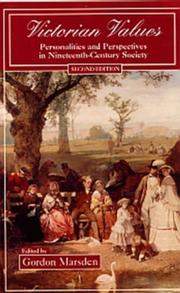| Listing 1 - 7 of 7 |
Sort by
|

ISBN: 0394716116 9780394716114 Year: 1983 Publisher: New York Pantheon Books
Abstract | Keywords | Export | Availability | Bookmark
 Loading...
Loading...Choose an application
- Reference Manager
- EndNote
- RefWorks (Direct export to RefWorks)
History of North America --- Sociology of culture --- anno 1800-1999 --- United States --- Consumption (Economics) --- Elite (Social sciences) --- Social values --- History --- Consumption (Economics) - United States - History --- Elite (Social sciences) - United States - History --- Social values - History --- United States of America
Book
ISBN: 0824025199 Year: 1990 Volume: vol *10 Publisher: New York Garland
Abstract | Keywords | Export | Availability | Bookmark
 Loading...
Loading...Choose an application
- Reference Manager
- EndNote
- RefWorks (Direct export to RefWorks)
History of Europe --- Art --- Sociology of culture --- Antiquity --- Suffering --- History --- Symbolism (Psychology) --- Art [Medieval ] --- Themes, motives --- Psychological aspects --- Suffering - History. --- Social values - History. --- Symbolism (Psychology) - History. --- Art, Medieval - Themes, motives - Psychological aspects.

ISBN: 0582292891 9780582292895 Year: 1998 Publisher: London Longman
Abstract | Keywords | Export | Availability | Bookmark
 Loading...
Loading...Choose an application
- Reference Manager
- EndNote
- RefWorks (Direct export to RefWorks)

ISBN: 0674268636 9780674268630 0674237110 Year: 1992 Publisher: Cambridge (Mass.) : Harvard university press,
Abstract | Keywords | Export | Availability | Bookmark
 Loading...
Loading...Choose an application
- Reference Manager
- EndNote
- RefWorks (Direct export to RefWorks)
Philosophy and psychology of culture --- General ethics --- Self-realization --- -Self-realization --- Fulfillment (Ethics) --- Self-fulfillment --- -Fulfillment (Ethics) --- Civilization, Modern --- Self-actualization (Psychology) --- Psychological aspects. --- Social aspects. --- Growth, Personal --- Personal growth --- Self-improvement --- Self-realization (Psychology) --- Humanistic psychology --- Mental health --- Motivation (Psychology) --- Psychological aspects --- Social aspects --- Social values --- History --- Civilization [Modern ] --- Self-realization - Social aspects. --- Civilization, Modern - Psychological aspects. --- Social values - History. --- Self-realization - Social aspects --- Civilization, Modern - Psychological aspects --- Social values - History
Book
ISBN: 0582036852 Year: 1990 Publisher: London Longman
Abstract | Keywords | Export | Availability | Bookmark
 Loading...
Loading...Choose an application
- Reference Manager
- EndNote
- RefWorks (Direct export to RefWorks)
History of civilization --- History of the United Kingdom and Ireland --- anno 1800-1899 --- Great Britain --- Social values --- Valeurs sociales --- History --- Histoire --- Grande-Bretagne --- Biography --- Social conditions --- Biographies --- Biographie --- Conditions sociales --- 19th century --- Victoria, 1837-1901 --- Great Britain - Social conditions - 19th century. --- Social values - History - 19th century. --- Great Britain - History - Victoria, 1837-1901 - Biography. --- Great Britain - Biography.
Multi
ISBN: 9781400865512 9780691160399 Year: 2015 Publisher: Princeton, N.J. Princeton University Press
Abstract | Keywords | Export | Availability | Bookmark
 Loading...
Loading...Choose an application
- Reference Manager
- EndNote
- RefWorks (Direct export to RefWorks)
Most people in the world today think democracy and gender equality are good, and that violence and wealth inequality are bad. But most people who lived during the 10,000 years before the nineteenth century thought just the opposite. Drawing on archaeology, anthropology, biology, and history, Ian Morris explains why. Fundamental long-term changes in values, Morris argues, are driven by the most basic force of all: energy. Humans have found three main ways to get the energy they need--from foraging, farming, and fossil fuels. Each energy source sets strict limits on what kinds of societies can succeed, and each kind of society rewards specific values. But if our fossil-fuel world favors democratic, open societies, the ongoing revolution in energy capture means that our most cherished values are very likely to turn out not to be useful any more. Foragers, Farmers, and Fossil Fuels offers a compelling new argument about the evolution of human values, one that has far-reaching implications for how we understand the past--and for what might happen next. Originating as the Tanner Lectures delivered at Princeton University, the book includes challenging responses by classicist Richard Seaford, historian of China Jonathan Spence, philosopher Christine Korsgaard, and novelist Margaret Atwood.
Philosophy --- Social sciences (general) --- History --- Agriculture -- Social aspects -- History --- Civilization -- Forecasting --- Civilization -- History --- Fossil fuels -- Social aspects -- History --- Hunting and gathering societies -- History --- Power resources --Social aspects -- History --- Social change -- History --- Social evolution -- History --- Social values -- History --- Social values --- Social evolution --- Social change --- Power resources --- Hunting and gathering societies --- Agriculture --- Fossil fuels --- Civilization --- Social aspects --- Forecasting
Book

ISBN: 9781400865512 1400865514 9780691160399 0691160392 0691175896 1336028157 Year: 2015 Publisher: Princeton University Press
Abstract | Keywords | Export | Availability | Bookmark
 Loading...
Loading...Choose an application
- Reference Manager
- EndNote
- RefWorks (Direct export to RefWorks)
Most people in the world today think democracy and gender equality are good, and that violence and wealth inequality are bad. But most people who lived during the 10,000 years before the nineteenth century thought just the opposite. Drawing on archaeology, anthropology, biology, and history, Ian Morris explains why. Fundamental long-term changes in values, Morris argues, are driven by the most basic force of all: energy. Humans have found three main ways to get the energy they need--from foraging, farming, and fossil fuels. Each energy source sets strict limits on what kinds of societies can succeed, and each kind of society rewards specific values. But if our fossil-fuel world favors democratic, open societies, the ongoing revolution in energy capture means that our most cherished values are very likely to turn out not to be useful any more. Foragers, Farmers, and Fossil Fuels offers a compelling new argument about the evolution of human values, one that has far-reaching implications for how we understand the past--and for what might happen next. Originating as the Tanner Lectures delivered at Princeton University, the book includes challenging responses by classicist Richard Seaford, historian of China Jonathan Spence, philosopher Christine Korsgaard, and novelist Margaret Atwood.
Agriculture -- Social aspects -- History --- Civilization -- Forecasting --- Civilization -- History --- Fossil fuels -- Social aspects -- History --- Hunting and gathering societies -- History --- Power resources --Social aspects -- History --- Social change -- History --- Social evolution -- History --- Social values -- History --- Social values --- Social evolution --- Social change --- Power resources --- Hunting and gathering societies --- Agriculture --- Fossil fuels --- Civilization --- Anthropology --- Social Sciences --- Social & Cultural Anthropology --- Barbarism --- Civilisation --- Auxiliary sciences of history --- Culture --- World Decade for Cultural Development, 1988-1997 --- Farming --- Husbandry --- Industrial arts --- Life sciences --- Food supply --- Land use, Rural --- Cultural history --- Fossil energy --- Fuel --- Energy minerals --- Food gathering societies --- Gathering and hunting societies --- Hunter-gatherers --- Hunting, Primitive --- Ethnology --- Subsistence hunting --- Energy --- Energy resources --- Power supply --- Natural resources --- Energy harvesting --- Energy industries --- Cultural evolution --- Cultural transformation --- Culture, Evolution of --- Evolution --- Values --- History --- Social aspects --- Forecasting
| Listing 1 - 7 of 7 |
Sort by
|

 Search
Search Feedback
Feedback About UniCat
About UniCat  Help
Help News
News